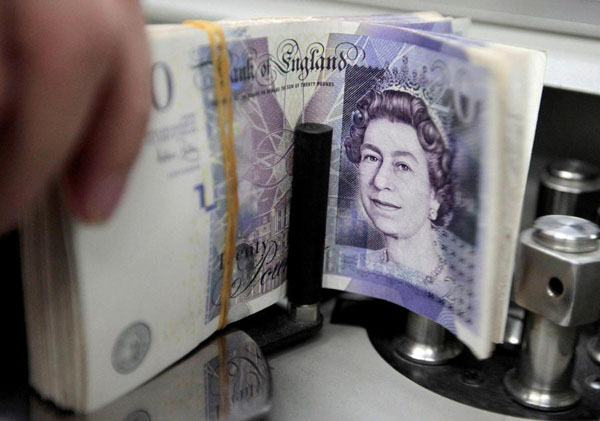 |
|
A bank employee counts pound notes at Kasikornbank in Bangkok, Thailand, October 12, 2010.? [Photo/Agencies] |
Sterling continued its downward slide, dipping below a value of $1.23 in early trading on Tuesday as uncertainty about the terms of Britain's exit from the European Union continued to plague the UK currency.
Although sterling has recovered from a technical "flash crash" that saw it tumble by 6 percent in Asian trading on Friday, it remains below the $1.26 it stood at before the dramatic one-day fall, and some analysts are predicting it may eventually hit parity with the US currency.
Analysts said sterling volatility was one factor in the decision on Monday by the People's Bank of China to set the midpoint of the yuan at its lowest against the dollar in six years. Traders attribute the present currency market volatility to a strengthening of the dollar amid expectations that the US Federal Reserve will raise interest rates by the end of the year.
In Britain, however, sterling's woes are being viewed mainly in the context of the country's Brexit referendum vote in June, on the eve of which the currency was trading at $1.50.
Opinion among politicians and economists has broadly split along pro- and anti-Brexit lines. Those who supported Britain remaining in the EU have argued that post-referendum uncertainty has prompted doubts about the future of the economy and spurred a sterling sell-off that will hit the British public by increasing the price of imports, including food.
Brexit supporters, including those who back Prime Minister
Theresa May's policy of a clean break with the EU's so-called single market, insist that sterling had long been overvalued and that a downward correction is both healthy and necessary. They also point to a rise in the sterling value of UK shares. They received some backing this week from Mervyn King, who was Bank of England governor at the time of the 2008 financial crisis. He told Sky News that lower sterling was a "welcome change" and that some reactions to the possible impact of Brexit were "over the top".
"The economy was slowing somewhat before the vote and we are in a position where the rest of the world is not offering us much help. So, from that point of view, the fall in sterling is a welcome change," King said.
Current Bank officials were circumspect about making predictions. In a note to MPs, Michael Saunders, Bank of England policymaker, said, "Given the scale and persistence of the UK's current account deficit, I would not be surprised if sterling falls further, but I am fairly agnostic as to whether any further depreciation is likely."
In Parliament on Monday, David Davis, the minister in charge of overseeing Brexit during a two-year negotiating period from next March, reacted to falls that have pushed sterling to 31-year lows by saying, "There will be lots of speculative comments in the next two-and-a-half-years that will drive the pound down and up and down and up and there is little we can do about that."
The writer is a senior editorial consultant for China Daily UK.